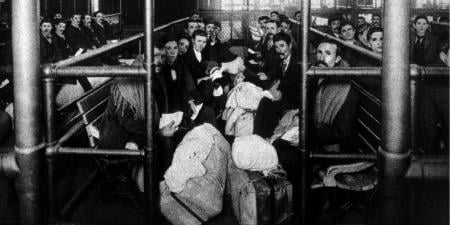Organs for transplant represent the extreme example of scarce resources in high demand. Because organ allocation decisions determine who lives and who dies, accusations of unethical transplant distribution practices raise public concern and directly impact organ donation rates. In 1984, the National Organ Transplantation Act defined organs as a "scarce public resource," the distribution of which should be governed "by criteria based on need, effectiveness, and fairness that are publicly stated and publicly defended" [1]. This article looks at how current transplantation guidelines sidestep the question of whether immigrants can receive organs. Do the guidelines meet various standards for justice and ethical treatment of illegal immigrants? If not, what is the possible impact of having unjust organ allocation policies?
Designation of Immigration Status
An individual granted permission by the U.S. government to enter the country on a temporary basis for purposes of tourism, business, education, medical care, or temporary employment is known as a non-resident alien (NRA). Another citizenship status designation is resident alien, that is, a person who is granted lawful permanent residence or asylee status, is admitted as a refugee or as a non-immigrant for a temporary stay in the United States, or is eligible for health care entitlement funds from state or federal government sources [2]. Lastly, the classification illegal alien or unauthorized resident is assigned to all foreign-born persons who enter the United States without inspection or are admitted temporarily and stay past the date they were required to leave [3].
The UNOS 5 Percent Rule
There are no written regulations addressing the receipt of organs by resident or illegal aliens at this time. There is regulation, however, regarding non-resident aliens. Member transplant centers where more than 5 percent of organ donation recipients are non-resident aliens are subject to review according to current UNOS (United Network of Organ Sharing) policy. UNOS is the federally appointed agent that coordinates all aspects of organ donation, from placing patients on the waiting list to allocating organs. In all likelihood, this policy was established to prevent well-connected foreign citizens from coming to the U.S. for the sole purpose of receiving organs through expert transplant surgery and care. The UNOS concern over this matter seems misplaced, however; the number of non-resident alien organ recipients from 1988 to 2007 was only 3,777 of 414,901 total recipients—less than 1 percent of all transplants [4]. Thus, it would seem that NRAs' receipt of organs is not significant, and the implications of the 5 percent rule cause questions and concern [5].
The Evidence about Immigrants and Organ Transplantion
Looking at heart transplantation, King and co-authors found that, at the time of donation, 25 percent of all organ donors did not have insurance or the private funds to pay for the surgery and care, and therefore would not have been eligible to receive an organ had they needed one [6]. This data applies to U.S. citizens and noncitizens alike. As King et al. explain in a Journal of the American College of Cardiology article, a system that allows individuals to donate to a pool of resources that they cannot draw from is inherently flawed [6].
Though there is no legislation that prevents illegal immigrants from obtaining transplants in the United States, lack of insurance coverage accomplishes that end [7, 8]. It is this sort of indirect exclusion that leads to misunderstanding and distrust of the system.
No comprehensive data on citizenship status of organ donors is available from procurement organizations, but there is detailed information available about the citizenship status of those awaiting transplant and those receiving organs. From 1988 to 2007 only 2,599 of the 414,901 organ transplants were received by individuals of unknown or unreported citizenship, a mere 0.63 percent [4]. A compilation of volunteered citizenship information from deceased donors collected by UNOS and the Organ Procurement and Transplantation Network (OPTN) revealed that 593 donors were of unknown citizenship and 7,670 donors were of unreported citizenship status, which accounted for a total of 2.5 percent of all organ donations from 1988 to 2007. This number (7,670) offers an approximate number of organ donations from those of unknown immigrant status and provides reason to believe that more organs are obtained from illegal immigrants than are received by this same group.
Despite evidence that immigrants donate more organs than they receive, articles in the media sensationalize a few instances in which illegal immigrants have received organs [9-11]. Will this biased portrayal, coupled with a general lack of access to organs, lead to fewer individuals donating a resource that is already in high demand and low supply? Moreover, how can we justify allowing illegal immigrants to donate, but not receive, organs?
The Justice Argument
Justice is the basis for our political and judicial systems, though the practical application of being "just, impartial or fair" [12] is not often discussed. John Rawls proposed that justice is reflected in standards set by people who act as though they were unaware of their own social standing [13]. People designing policy from behind this "veil of ignorance," as he calls it, act without self-regarding bias.
When Rawls's theory of justice is applied to organ transplantation, the key question to ask is, if individuals were unaware of their own citizenship status and their possible future need for organ transplantation, would they create a system in which an individual may donate to the organ pool but will most likely be unable to draw from it? Even those altruistic individuals who would donate an organ with no expectation of reciprocity would be unlikely to design a system in which this one-way participation existed. More importantly, is it just to have no policy whatsoever on illegal immigrants' eligibility for organ receipt when this lack fosters distrust of the system and impacts donation rates? Rawls's standard of justice is not met by the current UNOS policy. Are there other frameworks for moral behavior that are satisfied by the current policy?
The Social Contract Argument
As Hobbes explains, when individuals enter into a social contract, they forfeit certain rights and entitlements in return for peace and security within the community. Illegal immigrants have failed to abide by the laws of the United States and therefore are not prima facie participants in the social contract that ensures the rights of citizens. It could be argued, however, that a decision to admit an individual into the health care system as a donor should entail admitting that person into the community. Moreover, a failure to enact legislation on the matter neglects the society's obligation to create laws that make the terms of its social contract known to the whole community. Because there are worries about illegal aliens receiving scarce organs, society has an obligation to address the situation legislatively to maintain trust and cohesiveness within the society.
The Utilitarianism Argument
John Stuart Mill believed that a decision or action is judged as ethical or unethical by its outcomes rather than by its intentions. His doctrine of utilitarianism seeks the best outcome for the greatest number of people. This philosophy can be applied to organ allocation. Using the OPTN data cited earlier, illegal immigrants have contributed as much as 2.5 percent of all donations between 1988 and 2007, but have only received 0.63 percent of the organs [4]. Allowing illegal immigrants to donate and not receive augments the number of organs available to UNOS. On the utilitarian argument then, current policy produces the greatest good for the entire U.S. population, increasing the absolute numbers of organs donated. Unfortunately it fails to adequately address public concerns about the receipt of organs by illegal immigrants. This oversight impacts every immigrant awaiting transplantation and the entire health care system [14-17].
Conclusion
The perception of inequality in the organ allocation system makes all individuals less likely to donate and decreases the total number of organs available for transplant [18, 19]. Recent political debates about the "problem" of illegal immigration contribute to the emotional nature of the subject [20, 21]. Because so few people understand the allocation system's intricacies, the minuscule number of illegal aliens who receive organ transplants is held up as evidence of an unfair and corrupt system [15, 22-24]. The imperative to be both ethical and to augment donation rates makes it particularly challenging to design a transplant policy.
UNOS should develop a policy regarding illegal immigrants and transplantation so that the public will have greater confidence in the system. To best serve its mission, UNOS must re-evaluate public opinions regarding illegal immigrants' right to organ transplantation, acknowledge their impact on donation rates, and create a transparent policy regarding organ donation and receipt by illegal immigrants.
References
-
Committee on Organ Procurement and Transplantation Policy, Institute of Medicine. Organ Procurement and Transplantation: Assessing Current Policies and the Potential Impact of the DHHS Final Rule. Washington, DC: National Academy Press; 1999.
-
United Network of Organ Sharing. Transplantation of Non-Resident Aliens. June 24, 2005. Accessed March 18, 2008.
-
Organ Procurement and Transplantation Network. National Data Report. Accessed March 18, 2008.
-
Hoefer M, Rytina N, Campbell C. Estimates of the Unauthorized Immigrant Population Residing in the United States: January 2006.Washington, DC: Department of Homeland Security Office of Immigration Statistics; 2007. http://www.dhs.gov/xlibrary/assets/statistics/publications/ill_pe_2006.pdf. Accessed March 18, 2008.
-
Freeman RB. "Transplant Tourism" in the United States? Transplantation. 2007;84(12):1559-1560.
- King LP, Siminoff LA, Meyer DM, et al. Health insurance and cardiac transplantation: a call for reform. J Am Coll Cardiol. 2005;45(9):1388-1391.
-
Camarota SA. Immigrants in the United States, 2007: A Profile of America's Foreign-Born Population. Washington, DC: Center for Immigration Studies; 2007. http://www.cis.org/articles/2007/back1007.pdf. Accessed March 18, 2008.
- Goldberg AM, Simmerling M, Frader JE. Why nondocumented residents should have access to kidney transplantation: arguments for lifting the federal ban on reimbursement. Transplantation. 2007;83(1):17-20.
-
Mendieta A. Illegal immigrant dies of pneumonia after transplant. Chicago Sun-Times. January 23, 2002.
-
Murillo L. Boy discovered to be an illegal immigrant during cancer treatment. KVOA.com. Oct 12, 2007. Accessed March 18, 2008.
-
Romo R. Family hopes for miracle for sick teen. CBS2Chicago.com. February 10, 2006. Accessed March 18, 2008.
-
Merriam-Webster Dictionary. Justice. Springfield, MA: Merriam-Webster Incorporated; 2007:679.
-
Rawls J. A Theory of Justice. Cambridge, MA: Belknap Press; 1971.
- Friedman AL, Friedman EA. Illegal aliens are not entitled to federally funded transplants. Transplantation. 2007;83(1):21-23.
-
Hanson G. Illegal aliens bilk sick U.S. system. BNet Business Network. April 18, 1994. Accessed March 18, 2008.
-
Malkin M. America: medical welcome mat to the world. V-Dare.com. February 20, 2003. Accessed March 18, 2008.
-
Cosman MP. Illegal aliens and American medicine. Journal of American Physicians and Surgeons. 2005;10(1):6-10. http://www.jpands.org/vol10no1/cosman.pdf. Accessed March 18, 2008.
- Boulware LE, Troll MU, Wang NY, Powe NR. Perceived transparency and fairness of the organ allocation system and willingness to donate organs: a national study. Am J Transplant. 2007;7(7):1778-1787.
-
Phipps EJ, True G. Women, minorities, and organ donation in transplantation. In: The Ethics of Organ Transplantation, Vol 7. Amsterdam, Netherlands: JAI Press; 2001:317-337.
-
Pear R. Proposals from both sides fail in immigration debate. New York Times. June 27, 2007.
-
Preston J, Connelly M. Majority favor changing immigration laws, poll says. New York Times. May 24, 2007.
-
Irvine R, Kincaid C. Organ transplants for illegal aliens. Media Monitor.March 7, 2003. http://www.aim.org/media-monitor/organ-transplants-for-illegal-aliens/. Accessed March 18, 2008.
-
Kovacs J. Transplants for illegals igniting U.S. firestorm. WorldNetDaily.com. March 6, 2003. http://www.wnd.com/news/article.asp?ARTICLE_ID=31379. Accessed March 18, 2008.
-
Vedantam S. U.S. citizens get more organs than they give: donations from foreign residents on the rise. Washington Post. March 3, 2003:A03.



